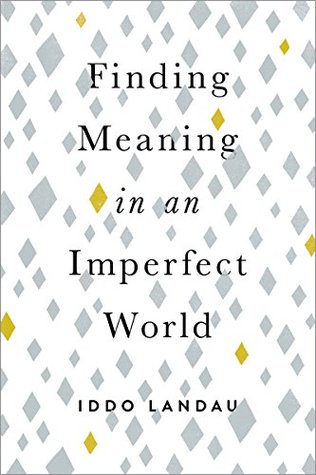Book Notes: Finding Meaning in an Imperfect World
Finding Meaning in an Imperfect World
by Iddo Landau
Read
Sep 19, 2018 -
Nov 4, 2018
⭐⭐⭐⭐
Finding Meaning in an Imperfect World (Landau, 2017) explores what makes human life meaningful, debunks some popular schools of thought that claim life to be pointless, and offers some practical ideas on how to make one’s life more meaningful.
For an academic philosophy text, this books feels very readable. (Granted, I did not dive in detail into all of the footnotes.) Landau takes a realistic, compassionate and pragmatic approach to the topic. “This book has made an effort to take the meaning of life off its pedestal.”, he tells us in the final conclusion. I recommend this book to anyone looking for a more rigorous approach to evaluating and increasing the meaningfulness of their life.
Landau explains that, in his view, the “meaning of life”, both of human life as a whole and that of individual lives, has to do with worth or value. It then follows that understanding what is of value to ourselves or others is essential to be able to evaluate meaningfulness in life.
He goes on to discuss several schools of thought and ideas (relativism, determinism, human life being too small in the context of the whole universe, life being pointless because it is transient, existentialism, there is too much suffering, humans are too evil) that hold life to be meaningless. He carefully explains the ways in which he believes these views are mistaken, because even if we accept the underlying assumptions in these schools of thought, none of them satisfactorily show that there is no value or worth in our lives.
At the core of most of these incorrect views is some variant or other of perfectionism. Perfectionists often fail to see the value in the good that is not perfect, and have implausible expectations that are likely to be disappointed. Landau also points out that a perfectionist attitude is often inconsistent: we accept imperfection in many spheres of life, but not others, with no clear explanation as to why the different standards. He also discusses how perfectionism is sometimes related to a narcissistic urge towards self-aggrandizement, or based on hyper-competitiveness. Furthermore, setting standards that are impossible to achieve is cruel, and it is morally forbidden to be cruel to any person or animal, including ourselves. Therefore, we should not set impossible standards for ourselves in any arena.
The final third of the book goes into practical ways in which we can increase the level of meaning in our lives. Landau breaks down these activities into two areas: identifying and recognizing.
“Identifying” is about exploring, introspecting and using trial-and-error to discover what do we personally consider of value in our lives. Here Landau offers a list of questions that we can ask ourselves to kick-start our explorations. He also offers a nuanced discussion of the need for balance between different sources of value, and points us at areas that many (most?) people usually consider of value — helping others and decreasing our own suffering.
“Recognizing” is about fine-tuning our ability to recognize that which is already meaningful in our lives. We often become numb to the value that exists in our lives, but we can also decide to sensitize ourselves. Landau asserts here that for the average person, “the worth we regularly fail to notice is considerable”. This definitely resonated for me, and also made me wonder if this is true across cultures, or if it is a particularly sharp issue in European and North American countries.
Finally, Landau reminds us that actually increasing the meaningfulness of our lives will require “practical work”, beyond a theoretical or academic understanding — we will need to put in some effort to re-wire some of our emotional habits or perfectionist inclinations. He acknowledges that some people have better starting points for meaningfulness than others, but believes that we can all increase the meaningfulness that is available to us through effort. He gives us a final caution about not putting too much effort into this (an exhortation that reminds me of the Buddhist concept of Right Effort), and that sometimes trying too hard is just another symptom of perfectionism.
Tags: books
